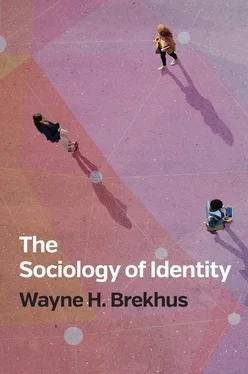Take for instance the strongly nationalist political cultural and turns now current in the United States, the United Kingdom, Brazil, and Italy. These movements may form around big issues such as immigration, the economy, resource allocation, organizations, crime and criminal justice, race, and class; but they are also—and intensely—about identity. They are both about the individuals’ perceptions of self-identity and about constructions of national and ethnic identities. Even the problem of gun access, an especially prominent topic in the United States, is significantly tied to identity, as owners of concealed carry guns often construct for themselves moral identities that are tied to tacit assumptions about the race, class, and masculinity of “good guys with guns” and about who needs protection and who falls outside the boundary (Stroud 2012, 2015). In a multicultural, globalizing world in which prominent issues of inclusion and exclusion appear in a wide variety of forms—for example, in immigration debates and controversies, in the British Brexit vote to exit the European Union, or in the rise of white nationalist identity politics in the United States and Europe—issues of identity are pushed to the forefront of sociological interest and concern. Identity provides a mechanism through which we can understand macro phenomena.
Identity is a central component of social life. It is the basic cognitive mechanism that people use to sort themselves, individually and collectively (Jenkins 2014). It helps us to develop a sense of who we are, how we relate to others, and how we make sense of the world. It is used to confer status and to mark stigma—in a word, to establish social positioning (Campion 2019).
Identities are socially and culturally constructed and are negotiated in complex, multidimensional ways. Their complexity is tied to cognitive and interactional dimensions of sociocultural privilege and marginalization. Multidimensional identities are constructed in both collective and individual forms, and privilege and marginalization are also negotiated both collectively and individually. Performing and defining the authenticity of one’s identity, emphasizing the multiple dimensions of one’s self or category, and shifting identities in a mobile fashion across space and time are just some of the ways in which complex identities are negotiated.
This book will orient readers to sociological approaches to understanding social identity, placing particular emphasis on concepts and ideas that arise from the sociological study of identity. While there has been much literature on self-identity from psychological, social psychological, and developmental perspectives, and while studies concerning the self, the social role, and the status of individuals have been ongoing, this book emphasizes identity as an inherently social phenomenon. The primary focus here is on the sociology of social identities rather than on the psychology of the self or on the experimental psychology and social psychology of self-identities. I will introduce and synthesize cultural, qualitative, and interactionist sociological approaches to the topic, emphasizing the complex social and intersectional nature of identities. The book is organized both around social influences on multidimensional self-identities and around collective identities of social forms other than individuals. In advancing a social and sociological concept of identity, I will highlight new and emerging notions of identity, while also calling attention to the foundational roots of more recent developments.
What is the nature of the self? How do we negotiate multiple identities? Is identity achieved or ascribed, self-appointed or other-defined? How do we construct boundaries of inclusion and exclusion through identity? How do power and privilege, oppression and stigma factor into identity? How do we negotiate multiple identities? How do identities shift from one setting to another? What is the role of place in constructing identity? How do cultural categories and patterns of cognitive attention and inattention shape identities? How is identity influenced by and managed through new technologies? How is identity mobile and fluid in a fast-paced, globalizing, multidimensional world? How do ethnocentrism and cosmopolitanism affect self-identity and collective identities? These are some of the questions that the present book will explore.
As a sociological account, the interactional accomplishment of identity in response to social settings and to cultural influences will be a significant focus. Identity is fluid, and it is negotiated, accomplished, and reaccomplished in social environments and cultural settings. Rather than focusing on it as something static and essential, I will place an emphasis here on the symbolic interactionist idea that identity develops through our relational interactions with others. With their notion of “doing difference,” West and Fenstermaker (1995) advance an understanding of difference as an ongoing interactional accomplishment. They build on West and Zimmerman’s (1987) conceptualization of gender as a routine, methodical, and ongoing accomplishment achieved through perceptual, interactional, and micro-political activities, to argue that, as organizing categories of social difference, gender, race, and class are all interactional accomplishments as well as comparable mechanisms for producing social inequality. West and Fenstermaker focus on race, class, and gender, but their approach is broadly relevant to categories of social difference. A sociological conception of identity is informed both by an interest in the social accomplishment of difference and identity and by a concern with how the accomplishment of difference (and of sameness) plays into the politics of exclusion and inclusion and produces and reproduces social inequalities. Combining interactional understandings of doing difference with cognitive sociological understandings of how we negotiate authenticity, multidimensionality, and mobility through the deployment and code-switching of marked (socially salient) and unmarked (socially taken-for-granted) attributes is a key element in this approach. The overall argument is that identities are socially created and negotiated (1) by performing, constructing, and navigating authenticity; (2) by balancing multiple attributes of privilege and marginalization; and (3) by deploying identity in a mobile, flexible, and fluid fashion across space and time. Identity is a strategic resource for negotiating boundaries and for managing power relations at both the individual and the collective level.
The material is organized as follows.
In chapter 1I introduce and discuss major sociological traditions in the study of social identity. These traditions are symbolic interactionism, Goffman’s dramaturgical sociology, Bourdieu’s theory of dispositional habits, modernity and postmodernity traditions, feminist standpoint theories such as intersectional analyses, and cultural cognitive symbolic boundaries traditions. Introducing these multiple approaches will serve to demonstrate the scope of theoretical research that explores the social and cultural dimensions of identities and to show how these traditions complement one another in painting a picture of the dynamic social character of identities. At the same time, these very traditions constitute a range of approaches that can inform one another and enhance our conceptual and empirical understanding of the sociology of identities. The various approaches presented in chapter 1can be brought into greater overlap and dialogue with one another to explicate our understanding of social identities as collective, complex, and multidimensional; and the unifying themes of authenticity, multidimensionality, and mobility cut across the variety of traditions.
Читать дальше












